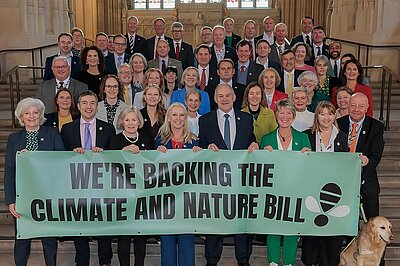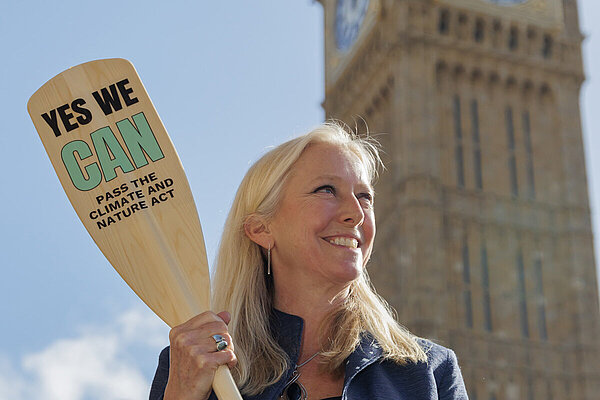The Climate and Nature Bill
Find Out More About the Bill and Find the Council Motion Below
Please see the latest update following the 2nd Reading on the 24th of January on the Bill's current progression: https://www.greenlibdems.org.uk/news/article/kicking-the-can-down-the-road-or-a-chance-for-cross-party-action

The Climate and Nature Bill
What is the CAN Bill and how does it differ from current legislation?
One of the most exciting developments to come out of the last few months has been the drawing of the Private Member's Bill, of which Liberal Democrat MP Roz Savage (South Cotswolds) was one of the names drawn. She has made the monumental step of re-introducing the CAN Bill into Parliament as her chosen bill.
This step has also led to the Liberal Democrat party being the second UK-wide party to support the bill in full, and all 72 MPs are now behind it. Caroline Lucas first introduced the bill in 2020, so it is high time for it's reintroduction and for the Liberal Democrats to show their full support.
But why is it so important? And what makes this new bill so ambitious and different from existing legislation?
The Zero Hour Climate and Nature Bill is an ambitious, science-led plan for carbon reduction and nature restoration. The bill ensures climate and nature policy are given equal priority in legislation, not diminishing the importance and urgency of either issue and emphasising their interconnectedness. It reaffirms the commitment to keep global warming under 1.5C and calls for a halt to nature decline and urgent restoration.
It goes further than the existing Environment Act in many ways. Most worryingly, the Environment Act relies on outdated science, some of which dates back to 2008. It's target of 2050 is a far too distant goal for carbon neutrality and provides no interim targets, a mistake that ignores the cumulative effects of emitting greenhouse gases over time.

As explained by Dr Charlie Gardner a scientist who helped create the bill, targets lose their value if they only provide a long-term goal. Simply put, it is not when you stop emitting; it is how much you also emit in the meantime, i.e., the cumulative emissions. The CAN Bill addresses this by using up-to-date scientific research to establish more short-term milestones to limit warming alongside a carbon budgeting system with clear strategy on how to get there, and addresses the impact of other greenhouse gases, which current legislation ignores, so we end the empty promises and can stop putting off radical change up until the last minute.
Current legislation is not up to scratch when it comes to addressing biodiversity loss either. A common theme seen when addressing environmental policy is that nature is often overlooked and ignored as the twin threat to climate change as well (Prof. Dame E.J. Milner Gullard). This has led to much inadequate policy.
The current bill (2021) calls for 2030 halting nature decline but provides no aims for restoration. Furthermore, the Environment Act only calls for the reversal of species loss. In contrast, the Climate and Nature Bill takes a holistic approach, aiming not just to prevent further species loss but to actively restore resilient ecosystems and habitats by 2030. It is not enough to just prevent the decline of species; we must be looking towards a net positive future.
Additionally, the new bill introduces a mitigation hierarchy, which would require developers to consider and minimise the environmental impact on site rather than offsetting biodiversity loss elsewhere. This approach ensures that any new development prioritises the preservation and resilience of local ecosystems.
Climate Justice
The Zero Hour CAN Bill, most importantly, outlines an approach with justice and fairness at its core. Protecting the most vulnerable populations globally, and our own UK citizens.
Global Justice
One of the most radical and exciting parts of this bill is that it is the first bill to address the global ramifications of resource exploitation and fossil fuel usage. Firstly, it focuses on the supply chain impact, particularly from abroad, which would force the UK Government to take accountability for environmental ramifications on our own procurement and imports (aviation and shipping), which lead to deforestation and rising carbon emissions all over the world; after all, the UK is the largest net importer of CO2 emissions in the G7. It is no longer enough for us to only decrease territorial emissions and restore our own nature.
Prof. Dame E.J. Milner Gullard, a biodiversity and conservation scientist, explains that most biodiversity loss is due to the overexploitation of land in our supply chains, particularly agriculture, such as animals, timber, fish, and land use conversion for animal feeds. Furthermore, these contribute to a huge pollution and pesticide problem. This is true both at home and overseas, as the UK and the EU are responsible for 25% of global ecological damage.
It is unjust to place the blame for environmental issues solely on the countries where they occur, thereby shifting the burden onto the most vulnerable populations who face the destruction of their homes and are most at risk from extreme weather events intensified by global greenhouse gas emissions.
The Zero Hour Climate and Nature Bill is revolutionary in addressing the global impact of resource exploitation and fossil fuel consumption. It emphasises both collective responsibility and individual nations' capabilities, taking into account national circumstances.
Citizen's Assemblies
A further visionary aspect of the CAN Bill that underscores its goal for fairness and justice is that it calls for the implementation of citizen's assemblies. We understand that a rapid move away from fossil fuel-intensive industries will require significant shifts in employment for those who work in those industries.
This fear of job loss is valid; the bill therefore emphasises the importance of involving citizens in the decision-making processes, but it falls on our government to work hard for a just transition and a movement to secure and sustainable new jobs in the low-carbon economy.
Citizen's assemblies allow for all voices to be heard, particularly those from the areas who are most worried about their future. This participatory approach also creates a space away from lobbyists and obstructors to the net zero message who create fear-mongering around job security and fiscal impacts and encourage climate scepticism.
Whilst the assemblies don't give formal decision-making powers to citizens, many normal people distrust the government to do what is in their interests, and citizen's assemblies allow for them to help politicians make change.

A Collaborative Approach
The bill emphasises not only a cross-party approach that calls for collaboration across parliament, but it also calls for a cooperative approach from all devolved nations, allowing more autonomy from these nations when it comes to addressing environmental issues that only affect their nation. The CAN Bill only covers issues dictated by Westminster, for example, Scotland has some of its own legislation on biodiversity which cannot be overruled by Westminster.
Currently, the Environment Act only covers England and Wales, and we must have a joined up approach. It is only coming out of DEFRA—we need to have treasury, home, and foreign offices all pulling in this direction and recognising climate change as a health, well-being, and economic issue (See our Campaign on the UN SDGs).
What Can You Do?
We are urging the collaboration across all levels of government and people, whether you are a councillor on a local authority which has not yet passed the CAN Bill Council motion (www.zerohour.uk/getting-your-local-council-on-board/).
And, you can urge your MP by emailing or pressuring in any way to back the Bill and to be there on the day of the second reading of the CAN Bill in Parliament, Friday 24 January 2025 (www.zerohour.uk).
There must be a minimum of 102 MPs voting in favour of the Bill, so ensuring we have as much backing as possible is vital. The CAN Bill needs your help!
https://www.zerohour.uk/downloads/climate-and-nature-bill-briefing.pdf
https://www.youtube.com/watch?v=wgdTocDPUX0&ab_channel=ZeroHour%3AClimateandNatureBill
By Katharine Ewing
